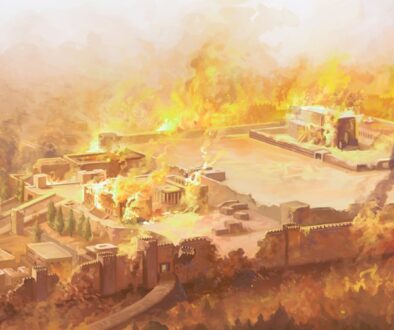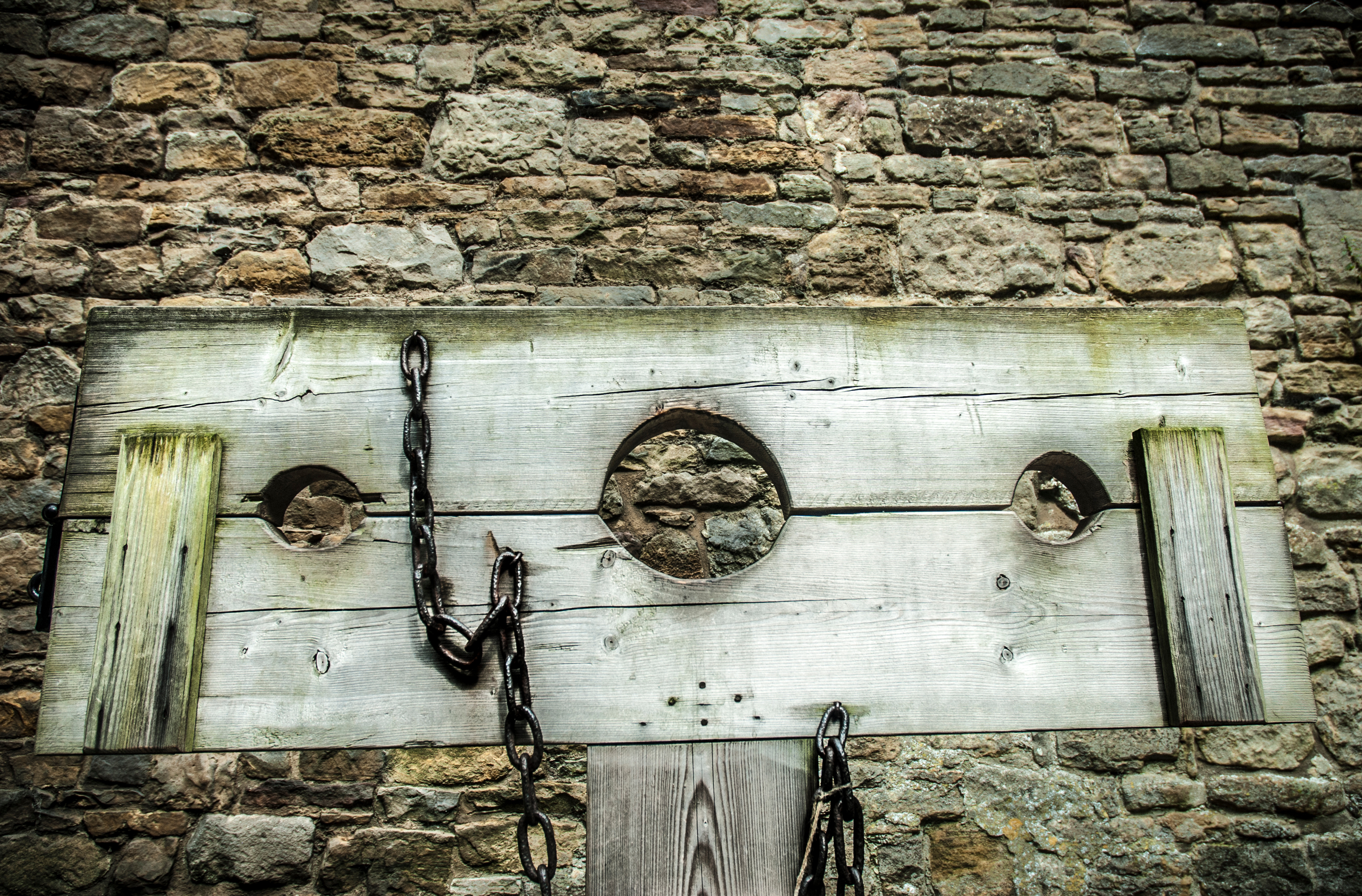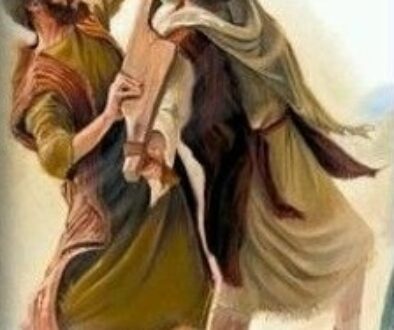Jeremiah After The Fall

Jerusalem has fallen. Jeremiah has much to tell us of what happened right after the fall. This is for those not taken to Babylon.
I can’t put a chapter number to our story today as things start moving pretty quick. We will be following Jeremiah while the dust settles and he is carried away to Egypt by those who remained in Judah.
I like sticking with the chronological order of things. I will certainly have to go back in time with Daniel. For today, let’s rejoin Jeremiah and allow the Spirit to lead us through the conclusion of his story.
♥ ♦ ♥
Jeremiah and all those who remained in Jerusalem look back over their shoulders many times as they are taken away in chains. Every time they look back, they see their beloved city on fire. Flames leaping into the air and devouring everything inside the walls. Many stop looking back at all because the sight is too painful.
The group of captives and their captors reach Ramah after more hours than the captors planned on taking for the journey. The pace is extremely slow because of the state of the people. They are all weak from starvation. The food was exhausted in the city for nearly a month before the walls fell. If the siege would have gone on for much longer, Nebuchadnezzar’s army might not have had any captives to take away to Babylon.
Now that they have reached Ramah, Nebuzardan orders the people fed. “None will survive the journey to Babylon if we don’t feed them.”
Nebuzardan has another task to complete, now that they have stopped. Nebuchadnezzar insisted that Nebuzardan protect Jeremiah, the prophet to Judah’s life.
A careful search of the captives in counduted. No one stops until Jeremiah is located and brought to Nebuzardan.
“Jeremiah, so good to finally meet you.”
Jeremiah bows. “Whom do I have the honor of speaking to” Jeremiah asks in a friendly tone.
“I am Nebuzardan, the chief bodyguard of King Nebuchadnezzar, and commander of his army. It is he who has ordered me to find you and deal kindly with you.”
“It is an honor to meet you.”
Nebuzardan doesn’t know how to respond to Jeremiah’s words, so he goes directly to the reason he had him brought before him.
“The Lord your God pronounced this disaster against this place. The Lord has brought it about, and has done as he said. Because you sinned against the Lord and did not obey his voice, this thing has come upon you. Now, behold, I release you today from the chains on your hands. If it seems good to you to come with me to Babylon, come, and I will look after you well, but if it seems wrong to you to come with me to Babylon, do not come. See, the whole land is before you; go wherever you think it good and right to go. If you remain, then return to Gedaliah the son of Ahikam, son of Shaphan, whom the king of Babylon appointed governor of the cities of Judah, and dwell with him among the people. Or go wherever you think it right to go” (Jeremiah 40:2-5).
“I will stay in the land of my people. They still need me and the Lord has not directed me to leave them yet.”
“Very well. Gedaliah the son of Ahikam, is at Mizpah. I will give you food and provisions for your journey to him. We travel in the other direction.”
Jeremiah joins Gedaliah and the people who remain flock to him. Gedaliah appoints Ishmael the son of Nethaniah, Johanan the son of Kareah, Seraiah the son of Tanhumeth, the sons of Ephai the Netophathite, Jezaniah the son of the Maacathite, and their men to help him. He cannot govern all the people on his own. And the number of people was increasing as those who had fled to other countries came back into the land. Now that the threat of Nebuchadnezzar is over, the people aren’t afraid to return.
Gedaliah is their direct line between the people and Nebuchadnezzar. “Do not be afraid to serve the Chaldeans. Dwell in the land and serve the king of Babylon, and it shall be well with you. As for me, I will dwell at Mizpah, to represent you before the Chaldeans who will come to us. But as for you, gather wine and summer fruits and oil, and store them in your vessels, and dwell in your cities that you have taken” (Jeremiah 40:1-10).
The people do as Gedaliah commands and they gather summer fruits and wine in abundance. It is a WONDERFUL change from what they have experienced over the last several years.
While the people enjoy the abundance and Gedaliah receives the devotion of the people, someone else in not happy. Baalis the king of the Ammonites is jealous and wants Gedaliah removed. He wants to see the rest of the people fall. He hires Ishmael to kill Gedaliah.
Johanan finds out about the plot and goes to Gedaliah. “Do you know that Baalis the king of the Ammonites has sent Ishmael the son of Nethaniah to take your life?” (Jeremiah 40
Gedaliah looks at Johanan and shakes his head. He can’t believe this. He won’t believe it.
Johana asks the unthinkable. “Please let me go and strike down Ishmael the son of Nethaniah, and no one will know it. Why should he take your life, so that all the Judeans who are gathered about you would be scattered, and the remnant of Judah would perish?” (Jeremiah 40:15).
“You shall not do this thing, for you are speaking falsely of Ishmael” Jeremiah 40:16) says Gedaliah. He will hear no more of this talk.
A month later, Gedaliah welcomes Ishmael and ten of his friends to dine with him. “Shalom Ishmael. How goes it in the western territory?”
“Things are going well. The harvest is plenty, the people are settling down, and even the wild animals are returning. I can’t ask for more.”
“I’m pleased to hear that. Things are going well here also. Even Nebuchadnezzar is leaving us to work out our issues on our own.”
Dinner conversation flows easily between the group. The food is delicious and the wine heady. Without Gedaliah noticing it, Ishmael nods to his men who are sitting on either side of Gedaliah. Together they pounce on him and pin his arms to his body. Ishmael rises from his place and walks around the table to where Gedaliah is being restrained. Ishmael draws his sword.
Gedaliah asks, “Why?” just before Ishmael runs him through.
“Because I was paid handsomely and I don’t like anyone who licks Nebuchadnezzar’s sandals” Ishmael says to a dying Gedaliah.
Ishmael and his men leave Gedaliah where he is and sneak through the city, killing everyone. By morning very few people remained alive. Those who were alive were crammed together in a house with a guard at the door. The king’s daughter and Jeremiah are among them.
While the people were being rounded up, 80 men came to Mizpah. They came from Shechem and Shiloh and Samaria and were planning to sacrifice grain to the Lord at the Temple. They found it destroyed. In their grief they shaved their heads and beards, tore their clothes, and cut gashes in their flesh. One of Ishmael’s men raises the alarm before they reach the city.
Ishmael comes out to greet them, weeping. He is a very good at acting. “Come in to Gedaliah the son of Ahikam” (Jeremiah 41:6b) welcomes Ishmael. “He will comfort you.”
Once the men are inside, Ishmael’s men surround them. None of the eighty men carried so much as a dagger, while Ishmael’s men have swords. The group is led over to a large cistern that King Asa had dug as defense against King Baasha of Israel.
Ishmael has them brought to him one at a time. He runs them through with his sword and throws their bodies into the cistern. One after another after another they fall. Their bodies creating a pile on one side of the cistern.
A group of ten of the eighty call out for mercy. “Do not put us to death, for we have stores of wheat, barley, oil, and honey hidden in the fields.”
“Take us to it when we leave here. If I find you have lied to me, your deaths will be extremely slow and painful.”
Ishmael’s men drag the dead of the city to the cistern and fill it with the slain. Gedaliah is the ‘crowning’ body on the heap. Ishmael’s men loot the city before leaving and chain the survivors together, to prevent any from escaping.
“Let’s go get those hidden stores” Ishmael says to one of the ten men. They too are chained together for the journey.
Ishmael and his men have no idea that they are being observed. A farmer who lives near the city of Mizpah sees Ishmael leading the people away in chains. Once they are out of sight, the farmer hurries to the city. There he finds the cistern FILLED with bodies. He recognizes his friends and neighbors as well as Gedaliah. He hurries off to tell Johanan.
“They are just over here” one of the ten survivors of the visiting group says, while pointing to a small cave.
“Bring it up to me and I will see if it is enough to pay for your lives.”
The men unearth their hidden stores and present them to Ishmael. He looks over them with greed written all over his face. “This will do. I will let you live.”
“Will you set us free?”
Ishmael laughs. “This is enough to save your lives, but not buy your freedom. The king of the Ammonites LOVES slaves. You will fetch me a good price.”
Johanan receives a message from the farmer who observed Ishmael. “Ishmael has killed Gedaliah and the people of Mizpah. He is marching the survivors across the plains towards Ammon.”
Johanan had many forces who were loyal to him. He quickly gathers all of them and goes in search of Ishmael. They catch up with Ishmael at the great pool that is in Gibeon. The captives see Johanan coming and begin cheering. This alerts Ishmael and his men. There are only eleven of them and fifty or more with Johanan.
“Scatter!” calls Ishmael.
“What about the captives and the spoils?” asks one of his men.
“If you want it, you stay with it! I’m leaving.”
Two of Ishmael’s men are cut down as they flee, but Ishmael and eight of them escape. Johanan is too busy caring for the captives to give chase. He will deal with Ishmael another day. “If only Gedaliah had listened to my warning” Johanan thinks as he releases the bonds of the people.
After freeing the people that Ishmael had taken from Mizpah, Johanan gathers all the people in Gibeon along with the captives. “We can’t stay here. Nebuchadnezzar may strike out against us for the death of Gedaliah. And we don’t know if Ishmael will be returning.”
Johanan leads the whole group to Geruth Chimham near Bethlehem. Here they will make plans for the future. Going to Egypt is the favored idea floating among the people but they turn to Jeremiah, in hopes of receiving the Lord’s direction.
“Let our plea for mercy come before you, and pray to the Lord your God for us, for all this remnant—because we are left with but a few, as your eyes see us— 3 that the Lord your God may show us the way we should go, and the thing that we should do” (Jeremiah 42:2-3).
Jeremiah looked at the ragged and weary people. People who are lost without a shepherd. “I have heard you. Behold, I will pray to the Lord your God according to your request, and whatever the Lord answers you I will tell you. I will keep nothing back from you” (Jeremiah 42:4).
Relief paints the people’s faces as the sun paints the morning sky. “May the Lord be a true and faithful witness against us if we do not act according to all the word with which the Lord your God sends you to us. Whether it is good or bad, we will obey the voice of the Lord our God to whom we are sending you, that it may be well with us when we obey the voice of the Lord our God” (Jeremiah 42:5-6).
Jeremiah prays to the Lord. And he waits for his response. Ten days of prayer finally brings an answer from the Lord. “Gather the people, from the greatest to the least” Jeremiah says to Johanan. “I have heard from the Lord, and ALL the people need to hear His answer to them.”
The people are quickly gathered together and Jeremiah goes to stand before them. “Thus says the Lord, the God of Israel, to whom you sent me to present your plea for mercy before him: If you will remain in this land, then I will build you up and not pull you down; I will plant you, and not pluck you up; for I relent of the disaster that I did to you. Do not fear the king of Babylon, of whom you are afraid. Do not fear him, declares the Lord, for I am with you, to save you and to deliver you from his hand. I will grant you mercy, that he may have mercy on you and let you remain in your own land. But if you say, ‘We will not remain in this land,’ disobeying the voice of the Lord your God and saying, ‘No, we will go to the land of Egypt, where we shall not see war or hear the sound of the trumpet or be hungry for bread, and we will dwell there,’ then hear the word of the Lord, O remnant of Judah. Thus says the Lord of hosts, the God of Israel: If you set your faces to enter Egypt and go to live there, then the sword that you fear shall overtake you there in the land of Egypt, and the famine of which you are afraid shall follow close after you to Egypt, and there you shall die. All the men who set their faces to go to Egypt to live there shall die by the sword, by famine, and by pestilence. They shall have no remnant or survivor from the disaster that I will bring upon them.
“For thus says the Lord of hosts, the God of Israel: As my anger and my wrath were poured out on the inhabitants of Jerusalem, so my wrath will be poured out on you when you go to Egypt. You shall become an execration, a horror, a curse, and a taunt. You shall see this place no more. The Lord has said to you, O remnant of Judah, ‘Do not go to Egypt.’ Know for a certainty that I have warned you this day that you have gone astray at the cost of your lives. For you sent me to the Lord your God, saying, ‘Pray for us to the Lord our God, and whatever the Lord our God says, declare to us and we will do it.’ And I have this day declared it to you, but you have not obeyed the voice of the Lord your God in anything that he sent me to tell you. Now therefore know for a certainty that you shall die by the sword, by famine, and by pestilence in the place where you desire to go to live” (Jeremmiah 42:9-22).
God, and Jeremiah, KNOW the people won’t listen to this warning. But it has to be given.
Azriah, Johanan and several others begin calling out to Jeremiah. “You are telling a lie. The Lord our God did not send you to say, ‘Do not go to Egypt to live there,’ but Baruch the son of Neriah has set you against us, to deliver us into the hand of the Chaldeans, that they may kill us or take us into exile in Babylon” (Jeremiah 43:2-3).
Jeremiah shakes his head in disgust. “Of all the convoluted excuses, how did they think this one up” wonders Jeremian.
Johanan and all his forces take the people to Egypt. Jeremiah has no choice in the matter. He is dragged along with the remnant of Judah. They settle in Tahpanhes in Egypt.
God is still watching over the people. He knows where each of them are. And His word will come to pass for every one of them. He has another visual message for Jeremiah to deliver.
“Take in your hands large stones and hide them in the mortar in the pavement that is at the entrance to Pharaoh’s palace in Tahpanhes, in the sight of the men of Judah” (Jeremiah 43:9).
Jeremiah finds two large stones and brings them to the entrance of Pharoah’s palace in Tahpanhes. There are men working on the pavement in front of the palace. They are refreshing the mortar. Jeremiah waits until he sees the people of Judah watching him. He walks over to where the men are working. He bends down and works the stones he is holding in between the stones that are already laid. He smooths the mortar back into place, stands, looks out at the people.
Jeremiah pulls a rag from his robe and wipes his hands. Then he shares the words the Lord gave him for the people. “Thus says the Lord of hosts, the God of Israel: Behold, I will send and take Nebuchadnezzar the king of Babylon, my servant, and I will set his throne above these stones that I have hidden, and he will spread his royal canopy over them. He shall come and strike the land of Egypt, giving over to the pestilence those who are doomed to the pestilence, to captivity those who are doomed to captivity, and to the sword those who are doomed to the sword. I shall kindle a fire in the temples of the gods of Egypt, and he shall burn them and carry them away captive. And he shall clean the land of Egypt as a shepherd cleans his cloak of vermin, and he shall go away from there in peace. He shall break the obelisks of Heliopolis, which is in the land of Egypt, and the temples of the gods of Egypt he shall burn with fire” (Jeremiah 43:10-13).
The people didn’t listen to Jeremiah’s warning any better this time than they had any other time. They immersed themselves in the Egyptian culture and spread out in the land. They lived in Migdol, at Tahpanhes, at Memphis, and in the land of Pathros.
God is angry with them. “Have they learned NOTHING? What is it going to take with these people?” It’s not that God doesn’t know all that is required, but He is frustrated with this group of people in particular.
He gives Jeremiah another message for them.
“Thus says the Lord of hosts, the God of Israel: You have seen all the disaster that I brought upon Jerusalem and upon all the cities of Judah. Behold, this day they are a desolation, and no one dwells in them, because of the evil that they committed, provoking me to anger, in that they went to make offerings and serve other gods that they knew not, neither they, nor you, nor your fathers. Yet I persistently sent to you all my servants the prophets, saying, ‘Oh, do not do this abomination that I hate!’ But they did not listen or incline their ear, to turn from their evil and make no offerings to other gods. Therefore my wrath and my anger were poured out and kindled in the cities of Judah and in the streets of Jerusalem, and they became a waste and a desolation, as at this day. And now thus says the Lord God of hosts, the God of Israel: Why do you commit this great evil against yourselves, to cut off from you man and woman, infant and child, from the midst of Judah, leaving you no remnant? Why do you provoke me to anger with the works of your hands, making offerings to other gods in the land of Egypt where you have come to live, so that you may be cut off and become a curse and a taunt among all the nations of the earth? Have you forgotten the evil of your fathers, the evil of the kings of Judah, the evil of their wives, your own evil, and the evil of your wives, which they committed in the land of Judah and in the streets of Jerusalem? They have not humbled themselves even to this day, nor have they feared, nor walked in my law and my statutes that I set before you and before your fathers.
“Therefore thus says the Lord of hosts, the God of Israel: Behold, I will set my face against you for harm, to cut off all Judah. I will take the remnant of Judah who have set their faces to come to the land of Egypt to live, and they shall all be consumed. In the land of Egypt they shall fall; by the sword and by famine they shall be consumed. From the least to the greatest, they shall die by the sword and by famine, and they shall become an oath, a horror, a curse, and a taunt. I will punish those who dwell in the land of Egypt, as I have punished Jerusalem, with the sword, with famine, and with pestilence, so that none of the remnant of Judah who have come to live in the land of Egypt shall escape or survive or return to the land of Judah, to which they desire to return to dwell there. For they shall not return, except some fugitives” (Jeremiah 44:2-14).
The people who stand listening to Jeremiah refuse to obey him and the Lord. The men know their wives have been sacrificing to idols, and they either don’t care or actively approved of it. They respond to Jeremiah and the Lord with insolence.
“As for the word that you have spoken to us in the name of the Lord, we will not listen to you. But we will do everything that we have vowed, make offerings to the queen of heaven and pour out drink offerings to her, as we did, both we and our fathers, our kings and our officials, in the cities of Judah and in the streets of Jerusalem. For then we had plenty of food, and prospered, and saw no disaster. But since we left off making offerings to the queen of heaven and pouring out drink offerings to her, we have lacked everything and have been consumed by the sword and by famine” (Jeremiah 44:16-18).
The women throw their voices in with their husbands’. “When we made offerings to the queen of heaven and poured out drink offerings to her, was it without our husbands’ approval that we made cakes for her bearing her image and poured out drink offerings to her?” (Jeremiah 44:19).
Jeremiah’s mouth drops open at their response. After a second, his jaw snaps shut. His eyes harden and he straightens to his full height. There is a bite in his voice that none can miss as he speaks the Lord’s judgment over them.
“As for the offerings that you offered in the cities of Judah and in the streets of Jerusalem, you and your fathers, your kings and your officials, and the people of the land, did not the Lord remember them? Did it not come into his mind? The Lord could no longer bear your evil deeds and the abominations that you committed. Therefore your land has become a desolation and a waste and a curse, without inhabitant, as it is this day. It is because you made offerings and because you sinned against the Lord and did not obey the voice of the Lord or walk in his law and in his statutes and in his testimonies that this disaster has happened to you, as at this day” (Jeremiah 44:21-26).
Jeremiah’s voice rises to a point that even the Egyptians are listening. “Hear the word of the Lord, all you of Judah who are in the land of Egypt. Thus says the Lord of hosts, the God of Israel: You and your wives have declared with your mouths, and have fulfilled it with your hands, saying, ‘We will surely perform our vows that we have made, to make offerings to the queen of heaven and to pour out drink offerings to her.’ Then confirm your vows and perform your vows! Therefore hear the word of the Lord, all you of Judah who dwell in the land of Egypt: Behold, I have sworn by my great name, says the Lord, that my name shall no more be invoked by the mouth of any man of Judah in all the land of Egypt, saying, ‘As the Lord God lives.’ Behold, I am watching over them for disaster and not for good. All the men of Judah who are in the land of Egypt shall be consumed by the sword and by famine, until there is an end of them. And those who escape the sword shall return from the land of Egypt to the land of Judah, few in number; and all the remnant of Judah, who came to the land of Egypt to live, shall know whose word will stand, mine or theirs. This shall be the sign to you, declares the Lord, that I will punish you in this place, in order that you may know that my words will surely stand against you for harm: Thus says the Lord, Behold, I will give Pharaoh Hophra king of Egypt into the hand of his enemies and into the hand of those who seek his life, as I gave Zedekiah king of Judah into the hand of Nebuchadnezzar king of Babylon, who was his enemy and sought his life” (Jeremiah 44:24-30).
When Jeremiah stops speaking, silence reigns for several minutes. What is not heard is people repenting, or people calling for mercy. Jeremiah turns and walks away from the crowd. “I can do no more” he says to himself and the Lord. “They are Yours to do with as You think best Lord.”
(to be continued)
I am blown away by the people turning to the gods of Egypt. Didn’t they learn ANYTHING?! I honestly don’t what to say about these people. Other that Lord, NEVER let me be one of them!
No matter where they went, God still saw them. No matter what they did, God still loved them. He KEPT sending His word to them. But He would NOT force them to follow Him. They received the consequences of their own actions. THEY made the choice to thumb their noses at God. He kept offering them a way out, and they wouldn’t take it. They loved their sin more than the loved or trusted Him.
What sin do I hold tight to, even though I KNOW God says to abandon it? Laziness? I do the things I have to do, but I find myself playing games on my Kindle or watching television when I should be doing other things; unloading the dishwasher, folding clothes, exercising, working on my village, etc…. That seems to be the thing that haunts me most right now. That and getting frustrated when I’m interrupted while I am doing something (including playing a game on my Kindle).
Father God, help me to let go of my sins. To listen and obey when You reprove me. To LEARN my lessons the FIRST time through! I know that I’m struggling with ‘time management’ and that I DO have a lot of things I do in my day. Help me to choose the things that are profitable for my spirit. And I know that sometimes, doing nothing is healing to my spirit. Help me know the difference between the two ‘down times’. And, again, help me with my frustration. I have noticed that You help me deescalate before I get to my husband’s side quite often. Thank You for that. But there is still work to be done. Especially in times of stress or crisis. Help me respond in love instead of fear or frustration.




